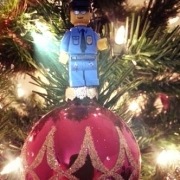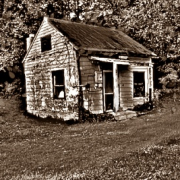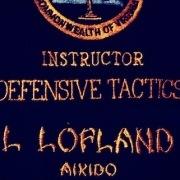The Christmas Orange
It was a Dark and Stormy Night …
I know the general rule of thumb is to not begin a tale with the weather, and I humbly apologize for violating protocol. It’s just that the elements are such a crucial part of this story and, well, please bear with me for a moment as I take you back to an honest-to-goodness dark and stormy Christmas Eve.
I was working for a sheriff’s office at the time, patrolling an area that sits smack-dab in the middle of the north-south I-95 drug corridor. Needless to say, crime, especially violent crime, was quite commonplace.
In those days, I drove a hand-me-down Crown Vic with a light bar that had a mind of its own. Sometimes the rotating beacons turned and sometimes they didn’t, with the latter occurring more frequently during cold weather. In fact, it wasn’t unusual for me to respond to an emergency with the gas pedal mashed to the floorboard, the siren screaming like a cat with its tail caught in the ringer of grandma’s antique washer, and me with my arm out the window banging my fist on the side of the light bar hoping to set it in motion. It often took a good two miles and ten whacks with the heel of my fist before the barely-turning speed of the lights caught up with the seriousness of the situation at hand.
Believe me, there’s nothing more frustrating than driving at warp speed while your emergency lights rotate at the speed of drying paint. But, if the call was far enough away the lights eventually caught up with the direness of what could be and often was.
Christmas Eve calls, for the most part, were an eclectic mix of complaints and incidents, ranging from window peepers to intoxicated uncles who were sloppy drunk on Jack Daniels chased with eggnog, to crooks who preferred to do their last minute shopping after the stores were closed and tightly locked until the day after Christmas. And, of course, there were murders and robberies, calls that necessitated the use of those darn lights.
Blowing Wind and Freezing Temps
There’s one particular Christmas Eve that comes to mind, though. The one when the wind blew so hard that traffic lights hung horizontally instead of their typical right angles to the streets. Gusty breezes toppled garbage cans and sent them clanging and banging and rolling and tumbling across asphalt and concrete. Dried leaves clicked and ticked and swirled in masses as they clicked and ticked and scratched and scraped their way down avenues and boulevards and through intersections without regard for stop signs, continuing on through alleys and across lawns and driveways. The lighted sign at the bank on the corner of Broad and 14th blinked between the current time and a steady temperature of five degrees. Believe me, it was cold enough to make a snowman shiver.
For warmth, homeless people camping under the overpasses and down by the river burned scraps of broken pallets and whatever twigs, branches, and tree limbs they could find. Many of them had no real winter clothing—no coats, parkas, gloves, or wool caps. Instead, they added extra layers of filthy, soiled clothing over their already grimy attire. They used socks to cover their hands and they draped old army blankets or blue furniture movers’ pads over their heads and shivering bodies.
Ridley Perkins
And then there was Ridley Perkins, a homeless man who’d been around the city for so long that his name and/or face was quite well-known by many of the locals in the areas he frequented. He was also a regular visitor to the city jail. Corrections officers, those who’d “seen it all,” shied away from Ridley when it came time for him to be strip searched. No one wanted the job of watching him peel off layer after layer of grunge-caked clothing. After all, Perkins’ body odor alone was enough to gag anyone, and it was not unusual to find live maggots squirming around in his soiled underwear or on his skin.
Ridley never committed any real crimes—he didn’t steal, rob, or burgle. He was a beggar by trade and a darn good one too. And he knew how to successfully transform a dollar into alcohol. Not the kind consumed by most drinkers, though. Ridley preferred to strain his alcohol from canned heat (Sterno), or to drink mouthwash or shaving lotion. And, when the last drop was gone he’d do something to annoy a business owner or scare a woman or child by lunging at them from behind a bush—his way of going to jail where he’d get a hot meal, a warm bed, his monthly shower (if that often), and clean clothes because the jail staff bagged the old ones and immediately tossed them into a dumpster behind the facility.
The Christmas Present
Okay, I know, I strayed from the story. Let’s see, where was I? Oh, yeah … Christmas Eve. I’d made a pass around my section of the county and had returned to the office to warm my bones with a cup of jailhouse coffee (so thick you could almost stand a spoon upright in the center of the mug) and to back my hind-end against a hot radiator. Even my long-johns, Kevlar, and coat were no match against the cold that night.
After I’d thawed, I settled into a seat and was skimming through newspaper headlines when someone pressed the buzzer out at the main gate. One of the on-duty jailers pushed the “talk” button on the intercom and said, “Whadda you want, Perkins?” I glanced over at the monitor and saw Ridley holding a round object up toward the camera. It appeared to be a ball of some sort. He pushed the outside talk button and said, “I brung you something. A Christmas present.”
The jail supervisor, a soft-hearted older man, slipped on his jacket and said he was going out to try and talk Ridley into going to a shelter for the night, something Ridley rarely did. He despised their “no tolerance for alcohol rule.” Before going out, the officer poured some hot coffee into a Styrofoam cup and took it with him to give to his visitor.
A few minutes later the supervisor returned with an orange, saying Ridley told him that he’d used some of his begging proceeds to buy it for him as a Christmas present. He claimed to have done so because the jailer had always been kind to him and treated him like a man and not as a criminal, or a drunk. We both knew that chances were good that he’d either stolen the orange from a local grocer or that someone had given it to him. But that he’d brought it to the jailer was still a kind gesture.
Ridley accepted the coffee from the jailer, listened to the advice about the shelter, and then headed off into the cold night, ambling past the reach of the camera. It was the last time anyone saw him alive.
We found Ridley’s body the next night, inside an old abandoned car. He’d apparently gone there to get away from the wind and the blowing snowfall that had started up in the early morning hours. Hypothermia had claimed his life. He’d frozen to death.
On the floorboard near Ridley’s hand were an empty Styrofoam cup and a small pile of orange peelings.
*This is a true story, however, the name Ridley Perkins is fictitious.











What a perfect tale for the season. Thank you and Warm and Happy Holidays to you.